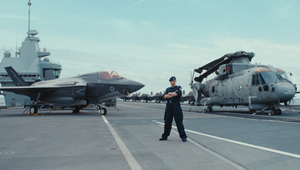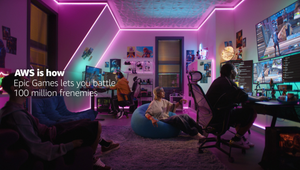
Sainsbury’s BFG Was A Real Puppet, Reveals Director Sam Brown

After last week’s conversation with the creative team at New Commercial Arts about the vision behind Sainsbury’s enchanting new Christmas campaign, we now turn to Sam Brown, the director who brought that vision to life on screen.
This year, Sainsbury’s has tapped into the magic of Roald Dahl’s ‘The BFG’, reimagining the beloved giant as he embarks on a festive culinary adventure with Sophie, a real Sainsbury’s employee. With stunning set designs, whimsical stop-frame puppetry, and a bespoke orchestral score recorded at Abbey Road, the advert blends nostalgia with modern-day holiday magic in a way that only one of Roald Dahl’s worlds could inspire. Combining traditional craftsmanship and cutting-edge technology, this year’s advert captures the hearts of viewers young and old, filling their homes with holiday cheer and a reminder of the magic of good food.
Today, Sam takes us behind the scenes of the production, revealing how he approached the challenge of making the larger-than-life BFG feel both believable and warm. From the intricacies of working with a 24-foot puppet to capturing the fantastical elements of the dream cave, Sam shares the creative decisions that made this campaign so special. He also discusses the importance of practical effects and in-camera magic, how his team worked with CGI to bring the BFG’s world to life, and the unexpected moments during filming that added to the final piece.
LBB> How did you approach creating the BFG’s size, movements, and interactions with Sophie and other elements on set to keep the magic alive?
Sam> The important thing for me was that he felt instantly warm and approachable. That’s where the idea of stop frame animation came from, because it has that lovely quality baked into it already. My first thought was, ‘well, that’s not going to work, because the BFG is too big’, but having slept on it, I realised it was exactly what I wanted to see: a 24-foot-tall puppet cavorting with Sophie around the English countryside. The big/small contradiction was so unlikely, it might actually be interesting. So, we phoned up Andy Gent and had him make one. (But obviously much smaller in scale, with the idea that ETC would make him bigger in post).

Above: Sam's sketches
LBB> Given the enchanting and whimsical tone of the ad, what were some of the unique production techniques or special effects you used to bring this story to life, especially in scenes like the sneeze and the dream cave?
Sam> It was important to us that everything was very grounded and in-camera, as much as the fantastical nature of the project would allow. ETC could have made a brilliant BFG cave in 3D, for example, but we decided to build it for real instead so that everything felt a little more tactile. It was a bit of a jigsaw puzzle because the cave was human scale and the BFG was built on a 2 foot scale (but needed to appear in the film as 24 feet tall) and Sophie needed to be 1/5th smaller than everything! So we spent a lot of time measuring, head scratching and saying ‘hang on a minute, that doesn't look right’.

Above: The cave on set
LBB> Roald Dahl’s world is distinctive and well-loved. How did the production team capture the charm of his stories, particularly through set design, costumes, and the fantastical elements like the ‘snozzcumber’?
Sam> Almost everything we needed was in Dahl’s text or Quentin Blake’s drawings, and the Roald Dahl Story Company was on hand to help with all the stuff that wasn’t. The team was understandably protective, but not at all precious or prescriptive and gave us the freedom to explore things in our own way. The ‘snozzcumbers’ were a case in point, because the description in the book is quite brief so we could play with our own design a bit. I wanted to build and shoot them in-camera, so there was a lot of experimentation with how lumpy the insides were, how rubbery the skin was, and how hairy they should be. We ended up using mouldy walnuts as pips.
LBB> What were some of the logistical challenges in filming scenes where the BFG and Sophie interact with Sainsbury’s real products and suppliers, and how did you overcome them?
Sam> Shooting for CG characters is a funny process. You show up with elaborate previsualisations and cutting-edge 3D mapping software, but it normally just ends up with someone running around with a tennis ball stuck on the end of a stick while I leap about doing stupid voices. It’s always reassuring to me that, no matter how sophisticated your setup is, the process is often like making a student film. Sophie was an actual Sainsbury’s employee with no real acting experience, so it was a big ask for her to imagine all the things she did. She did a great job.

LBB> The ad features a 54-piece orchestra for a bespoke soundtrack by Alex Baranowski. How did the music recording process at Abbey Road impact the final feel of the ad, and what was it like working with such a large ensemble?
Sam> An orchestral score is one of those things that’s brilliantly unfakeable. To get the richness and quality, you have to assemble an orchestra and do it, plain and simple… Which is great, because the process is absolutely electrifying from start to finish. Watching the music team at work is a bit like watching a film crew in full flood: time is short, everyone has a very specific and highly skilled role, and they converse in a technical language that’s gobsmackingly impenetrable to the untrained. Alex is a genius, the team is lovely, and they always let me sit in the room with the musicians so I can feel my insides vibrating. And Abbey Road adds that bit of magic, obviously.

Above: Sophie and BFG's head on the left and shooting on location on the right
LBB> What role did visual effects play in this production, particularly in making the BFG’s magical dream cave and his interactions with the world around him feel believable?
Sam> We used stop-frame animations of key sequences using our real BFG puppet as reference for CGI animators, but we also shot clips of ourselves goofing about and acting things out to nobble specific motions. Because we had the real puppet, we could also take him to all the locations and position him in front of the camera to give us invaluable lighting reference for the compositors. Everything was very secret, so we had to whip him in and out of his suitcase quickly.
LBB> Filming took place in various locations, from Sainsbury’s suppliers to the fantastical cave. Could you share any behind-the-scenes stories or unexpected moments from filming that helped shape the final result?
Sam> Many of the exteriors were a washout. We were lashed by gales and torrential rain the whole time, with pauses just long enough for us to un-bag all the cameras and drag our talent out of their tents before immediately tipping it down again. In most cases, it forced us to improvise and keep things very simple, and the results were unexpectedly good. This business is always handing me lessons.















